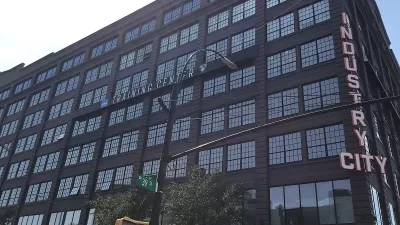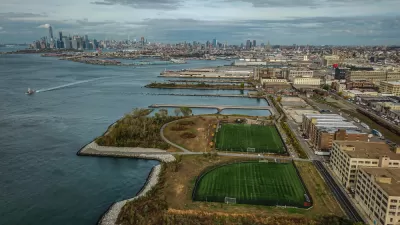Neighborhood rezonings that disproportionately displace minority residents could violate the Fair Housing Act, advocates say.

With five New York neighborhood rezonings complete in Mayor Bill de Blasio's Housing New York Plan, advocates are pressing the city to add a racial impact component to its environmental review process before undertaking further land-use reforms. Not doing so could put the city in violation of the Fair Housing Act, they warn.
In Brooklyn Eagle, Chase Brush explains that the City Environmental Quality Review currently includes an analysis of a project's potential to cause "secondary" displacement by creating a "change in socioeconomic conditions." But its scope is limited to impacts on low-income tenants of small buildings in areas that are not already experiencing gentrification or displacement.
Advocates, including State Senator Julia Salazar and District Leader Tommy Torres, want the environmental review to require an explicit analysis of how rezonings and other actions could impact the racial and demographic composition of neighborhoods—particularly whether they would have a "disparate impact" on Black and brown residents. The push comes in part from the experience in Williamsburg, where displacement of minority residents "quickened noticeably" after the neighborhood was rezoned in 2005.
"In their experience, rezonings have the potential to accelerate speculation and development in a neighborhood, which can in turn lead to higher rents and increased levels of tenant harassment and evictions," Brush writes. "And those changes can be especially devastating in low income and minority areas, two features that characterize many of the neighborhoods de Blasio has targeted in his rezonings."
FULL STORY: Demands for racial impact studies grow amid de Blasio rezonings

Planetizen Federal Action Tracker
A weekly monitor of how Trump’s orders and actions are impacting planners and planning in America.

Chicago’s Ghost Rails
Just beneath the surface of the modern city lie the remnants of its expansive early 20th-century streetcar system.

San Antonio and Austin are Fusing Into one Massive Megaregion
The region spanning the two central Texas cities is growing fast, posing challenges for local infrastructure and water supplies.

Since Zion's Shuttles Went Electric “The Smog is Gone”
Visitors to Zion National Park can enjoy the canyon via the nation’s first fully electric park shuttle system.

Trump Distributing DOT Safety Funds at 1/10 Rate of Biden
Funds for Safe Streets and other transportation safety and equity programs are being held up by administrative reviews and conflicts with the Trump administration’s priorities.

German Cities Subsidize Taxis for Women Amid Wave of Violence
Free or low-cost taxi rides can help women navigate cities more safely, but critics say the programs don't address the root causes of violence against women.
Urban Design for Planners 1: Software Tools
This six-course series explores essential urban design concepts using open source software and equips planners with the tools they need to participate fully in the urban design process.
Planning for Universal Design
Learn the tools for implementing Universal Design in planning regulations.
planning NEXT
Appalachian Highlands Housing Partners
Mpact (founded as Rail~Volution)
City of Camden Redevelopment Agency
City of Astoria
City of Portland
City of Laramie





























